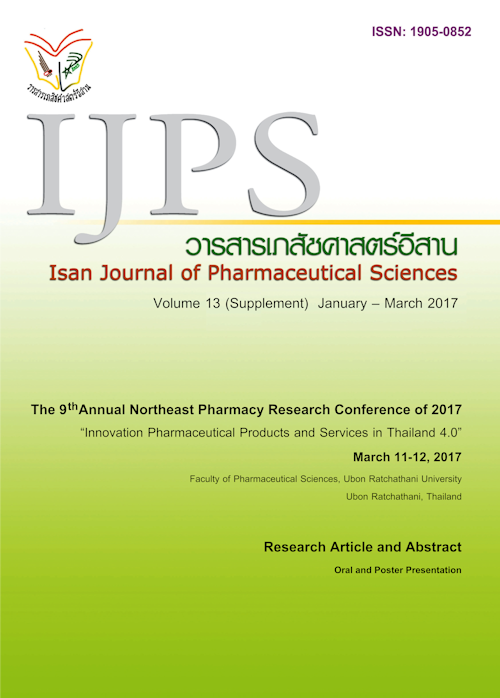Attitude of Hospital Pharmacists Under the Office of Permanent Secretary, Ministry of Public health, in Procurement Concerning Drug Quality
Main Article Content
Abstract
Introduction: This survey research aimed to measure the hospital pharmacistst attitudes towards drug quality in procurement. Methods: Data were collected using a self-administered questionnaire that consisted of 25 items with a 5-point Likert rating scale. The content validity was assessed by three experts. The reliability was assessed using Cronbachts alpha coefficient of 0.70. The study sample was hospital pharmacists who were mainly responsible for drug procurement (one pharmacist within each hospital). Mail questionnaires were sent to total of 831 hospitals that were under the Office of Permanent Secretary, Ministry of Public Health. The study time period was January 2016 to April 2016. Data were analyzed using descriptive statistics, and exploratory factor analysis. Results: A total of 309 completed questionnaires were analyzed, and this indicated a response rate of 37.18%. Five factors indicating attitude were extracted. Hospital pharmacists who agreed with the statements concerning {attitude to medicine|, {attitude to procurement problems|, {attitude to manufacturer|, {attitude to policy| and {attitude of the procurement officer| were 77-95%, 46-84%, 55-74%, 60-67% and 84-95%, respectively. Conclusion: Most of the participating hospital pharmacists agreed with all factors toward drug quality in procurement. Attitude was related to quality- drug procurement should be concerned. Nevertheless, further study of explaining factors that associated with drug quality concerning attitude should be conducted, to accomplish the deep understanding in the future.
Article Details
In the case that some parts are used by others The author must Confirm that obtaining permission to use some of the original authors. And must attach evidence That the permission has been included
References
Gumucio S. Data collection: Quantitative methods: The KAP survey model (knowledge, attitude & practices). French: IGC Communigraphie; 2011.
Huff-Rousselle M. The logical underpinnings and benefits of pooled pharmaceutical procurement: A pragmatic role for our public institutions? Social Science & Medicine 2012; 75: 1572-1580.
Management Sciences for Health. Drug and Therapeutics Committee Training Course: Session 5: Drug Quality Assurance. Virginia: Management Sciences for Health; 2001.
Management Sciences for Health. Part II Pharmaceutical Management: Procurement: Chapter 19 Quality assurance for pharmaceutical. Virginia: Management Sciences for Health; 2012.
Ombaka E. Current status of medicines procurement. Am J Health Syst Pharm2009; 66(3): S20-28.
Prapunwattana M. Safety medication system. Bangkok: The Association of Hospital Pharmacy (Thailand); 2010.
Savetsila S, Hongthong S, Likitthanaset M. Quality Assurance for Pharmaceutical Products Used in Public Hospitals. Journal of Health Science 2014; 23(3): 501-12.
Suwan P. Attitude: measurement, change, and health behavior. Bangkok: Odeon Store; 1983.
United States Pharmacopeia Drug Quality and Information Program and Collaborators. Ensuring the Quality of Medicines in Resource-Limited Countries: An Operational Guide. Washington, D.C.: Meadows Design. 2007.
World Health Organization (WHO). Operational principles for good pharmaceutical procurement. Geneva: WHO. 1999.
Worapongsathorn T. Principle of public health research. Bangkok: Chulalongkorn University Press; 1997.


